- Home
- Nancy Warren
The Great Witches Baking Show
The Great Witches Baking Show Read online
Contents
Introduction
Prologue
Chapter 1
Chapter 2
Chapter 3
Chapter 4
Chapter 5
Chapter 6
Chapter 7
Chapter 8
Chapter 9
Chapter 10
Chapter 11
Chapter 12
Chapter 13
Chapter 14
Chapter 15
Chapter 16
Chapter 17
A Note from Nancy
Poppy’s Recipe for Tarte au Citron
Also by Nancy Warren
Acknowledgments
About the Author
Introduction
A baker with secrets
Witches in trouble
The cameras are rolling
On your marks, get set, die!
Poppy Wilkinson is thrilled to be chosen as a contestant on The Great British Baking Contest. As an American with English roots, winning the crown as Britain’s Best Baker would open doors she’s dreamed of. In more ways than one. Appearing on the reality show is her chance to get into Broomewode Hall and uncover the secrets of her past.
But strange things are happening on the show’s set: accusations of sabotage, a black cat that shadows Poppy, suspiciously unsociable residents at Broomewode Hall—and the judges can be real witches.
There are murmurs that Broomewode is an energy vortex. It certainly makes Poppy see and do things that aren’t exactly normal, and seems to draw interesting characters to the neighborhood.
When a fellow contestant dies in mysterious circumstances, Poppy has more to worry about than burned pies and cakes that won’t rise. There’s a murderer on the loose and it’s up to Poppy and her new friends to solve the crime before it becomes a real show-stopper.
From USA Today Bestselling Author Nancy Warren, this delicious series of cozy paranormal mysteries will have you guessing until the end. Includes recipes.
First in a delicious new series of culinary cozy mysteries!
The best way to keep up with new releases and special offers is to join Nancy’s newsletter at nancywarren.net.
Praise for The Great Witches Baking Show
“I loved it! I could not put it down once I'd started it.”
Gatorfan, Amazon Top 500 Reviewer
“The characters are wonderful. More, please!”
Barb, Goodreads Reviewer
“This book was funny, sweet and had a good amount of mystery and suspense which kept me invested throughout. I cannot wait to read the next book in this series.”
Erin, Goodreads Reviewer
Prologue
Elspeth Peach could not have conjured a more beautiful day. Broomewode Hall glowed in the spring sunshine. The golden Cotswolds stone manor house was a Georgian masterpiece, and its symmetrical windows winked at her as though it knew her secrets and promised to keep them. Green lawns stretched their arms wide, and an ornamental lake seemed to welcome the swans floating serene and elegant on its surface.
But if she shifted her gaze just an inch to the left, the sense of peace and tranquility broke into a million pieces. Trucks and trailers had invaded the grounds, large tents were already in place, and she could see electricians and carpenters and painters at work on the twelve cooking stations. As the star judge of the wildly popular TV series The Great British Baking Contest, Elspeth Peach liked to cast her discerning eye over the setup to make sure that everything was perfect.
When the reality show became a hit, Elspeth Peach had been rocketed to a household name. She’d have been just as happy to be left alone in relative obscurity, writing cookbooks and devising new recipes. When she’d first agreed to judge amateur bakers, she’d imagined a tiny production watched only by serious foodies, and with a limited run. Had she known the show would become an international success, she never would have agreed to become so public a figure. Because Elspeth Peach had an important secret to keep. She was an excellent baker, but she was an even better witch.
Elspeth had made a foolish mistake. Baking made her happy, and she wanted to spread some of that joy to others. But she never envisaged how popular the series would become or how closely she’d be scrutinized by The British Witches Council, the governing body of witches in the UK. The council wielded great power, and any witch who didn’t follow the rules was punished.
When she’d been unknown, she’d been able to fudge the borders of rule-following a bit. She always obeyed the main tenet of a white witch—do no harm. However, she wasn’t so good at the dictates about not interfering with mortals without good reason. Now, she knew she was being watched very carefully, and she’d have to be vigilant. Still, as nervous as she was about her own position, she was more worried about her brand-new co-host.
Jonathon Pine was another famous British baker. His cookbooks rivaled hers in popularity and sales, so it shouldn’t have been a surprise that he’d been chosen as her co-judge. Except that Jonathon was also a witch.
She’d argued passionately against the council’s decision to have him as her co-judge, but it was no good. She was stuck with him. And that put the only cloud in the blue sky of this lovely day.
To her surprise, she saw Jonathon approaching her. She’d imagined he’d be the type to turn up a minute before cameras began rolling. He was an attractive man of about fifty with sparkling blue eyes and thick, dark hair. However, at this moment he looked sheepish, more like a sulky boy than a baking celebrity. Her innate empathy led her to get right to the issue that was obviously bothering him, and since she was at least twenty years his senior, she said in a motherly tone, “Has somebody been a naughty witch?”
He met her gaze then. “You know I have. I’m sorry, Elspeth. The council says I have to do this show.” He poked at a stone with the toe of his signature cowboy boot—one of his affectations, along with the blue shirts he always wore to bring out the color of his admittedly very pretty eyes.
“But how are you going to manage it?”
“I’m hoping you’ll help me.”
She shook her head at him. “Five best-selling books and a consultant to how many bakeries and restaurants? What were you thinking?”
He jutted out his bottom lip. “It started as a bit of a lark, but things got out of control. I became addicted to the fame.”
“But you know we’re not allowed to use our magic for personal gain.”
He’d dug out the stone now with the toe of his boot, and his attention dropped to the divot he’d made in the lawn. “I know, I know. It all started innocently enough. This woman I met said no man can bake a proper scone. Well, I decided to show her that wasn’t true by baking her the best scone she’d ever tasted. All right, I used a spell, since I couldn’t bake a scone or anything else, for that matter. But it was a matter of principle. And then one thing led to another.”
“Tell me the truth, Jonathon. Can you bake at all? Without using magic, I mean.”
A worm crawled lazily across the exposed dirt, and he followed its path. She found herself watching the slow, curling brown body too, hoping. Finally, he admitted, “I can’t boil water.”
She could see that the council had come up with the perfect punishment for him by making the man who couldn’t bake a celebrity judge. He was going to be publicly humiliated. But, unfortunately, so was she.
He groaned. “If only I’d said no to that first book deal. That’s when the real trouble started.”
Privately, she thought it was when he magicked a scone into being. It was too easy to become addicted to praise and far too easy to slip into inappropriate uses of magic. One bad move could snowball into catastrophe. And now look where they wer
e.
When he raised his blue eyes to meet hers, he looked quite desperate. “The council told me I had to learn how to bake and come and do this show without using any magic at all.” He sighed. “Or else.”
“Or else?” Her eyes squinted as though the sun were blinding her, but really she dreaded the answer.
He lowered his voice. “Banishment.”
She took a sharp breath. “As bad as that?”
He nodded. “And you’re not entirely innocent either, you know. They told me you’ve been handing out your magic like it’s warm milk and cuddles. You’ve got to stop, Elspeth, or it’s banishment for you, too.”
She swallowed. Her heart pounded. She couldn’t believe the council had sent her a message via Jonathon rather than calling her in themselves. She’d never used her magic for personal gain, as Jonathon had. She simply couldn’t bear to see these poor, helpless amateur bakers blunder when she could help. They were so sweet and eager. She became attached to them all. So sometimes she turned on an oven if a baker forgot or saved the biscuits from burning, the custard from curdling. She’d thought no one had noticed.
However, she had steel in her as well as warm milk, and she spoke quite sternly to her new co-host. “Then we must make absolutely certain that nothing goes wrong this season. You will practice every recipe before the show. Learn what makes a good crumpet, loaf of bread and Victoria sponge. You will study harder than you ever have in your life, Jonathon. I will help you where I can, but I won’t go down with you.”
He leveled her with an equally steely gaze. “All right. And you won’t interfere. If some show contestant forgets to turn their oven on, you don’t make it happen by magic.”
Oh dear. So they did know all about her little intervention in Season Two.
“And if somebody’s caramelized sugar starts to burn, you do not save it.”
Oh dear. And that.
“Fine. I will let them flail and fail, poor dears.”
“And I’ll learn enough to get by. We’ll manage, Elspeth.”
The word banishment floated in the air between them like the soft breeze.
“We’ll have to.”
Chapter 1
As life-changing moments go, getting the call that I’d been chosen to compete in The Great British Baking Contest was right up there. I’d practiced, auditioned and practiced some more. I was a decent home baker, but was I really the best in Britain? Probably not. But I didn’t have to be.
The contest was my way of getting into Broomewode Hall, where the show was filmed. I had my own reasons for going there that had nothing to do with baking.
Still, it hadn’t been easy to be chosen. There were thousands of applicants every year and then an excruciating selection process, where the show’s producers chose twelve from the short list and made us bake on camera. Some people went to pieces; some were just really boring. They randomly selected bakers off the short list and tried out different combinations of personalities, a bit like baking, really, seeing which ingredients created the most interesting results. I quickly learned that the trick was to be a good character, try to be funny, be a good sport, pretend you didn’t notice that cameras were on you and a clock was ticking down the minutes, and still turn out a decent jam tart.
Easy peasy! Not.
One of the reasons they chose me for the show, I think, was that while I was British, I’d grown up in the States, which was kind of fun, as the show had become a huge hit in America. I’d also started life in a bakery. Or, more accurately, in a cardboard box outside a bakery in Norton St. Philip, a charming village near Bath in Somerset.
I like to think my mother, whoever she was, chose the bakery so she knew I’d be warm and, since bakers start work so early, I’d be found. And I was. When Gareth Philpott came to work that morning, he said he looked into the box and found me wide-awake, staring up at him. Not crying, not fussing, just staring as though I’d expected him. They named me Poppy. The Philpotts would have kept me if they could have. They’re a nice family, but they already had three children, and the authorities don’t just give a family a baby because they happened to stumble across one. First they tried to find my mother or any information at all about my origins. When that proved impossible, I was adopted by Agatha and Leland Wilkinson, and they became my parents.
They were both teachers. They’d tried for years to have their own children, and their delight in getting me was reflected in the way they pretty much turned their lives around to give me the best upbringing they could. They were loving parents, kind and patient. Strict when they had to be. We lived in Bath for the first eight years of my life, and then my dad was offered a teaching job in Seattle.
I grew up there, mostly, lost the British accent, became a typical American teenager, and then when I finished high school, my folks retired and moved back to the UK. I could have stayed in Seattle. I had friends, and I could’ve gone to college there, but I chose to come back to England. I think, deep down, it’s always felt like home. Besides, like a lot of adopted kids, the mystery of my beginnings haunts me.
Soon after returning to England, my folks moved to the south of France to bask in warmer weather, grow lavender and cook gourmet meals. My dad, who taught history, was writing a book. My mom was learning French.
They’d saved up a nice chunk of change for me to go to college but, in spite of having teachers as parents, I never felt the urge. I was always more artistic than intellectual, so I went to an art and design college for two years, and they let me use the rest of the money toward buying a tiny cottage in Norton St. Philip. It’s probably crazy, and nobody even thinks my mother was from there, but I started my life in that village and so it pulled me back. The Philpotts still ran the bakery and were my second family. I guess you’ll always have a bond with the person who picked you up off the street as a newborn. Besides, growing up as an only child, I was fascinated by their sprawling, noisy family.
I became a freelance graphic designer, which allowed me to work from home. Yes, it could be lonely, but it was easier to hide my condition. I don’t know what else to call it.
I see people who aren’t really there.
When I was little, I was often visited by a boy about my own age. He was kind of bossy and talked funny, but he was my playmate. He told me his name was Peter. When my parents found out about Peter they took me to a child psychologist, and everyone determined that I had an imaginary friend, perfectly common in only children.
Good thing I never told anyone that Peter wore strange clothes. Not until much later, when I was researching the history of the Pacific Northwest for a high school essay, did I see pictures of that same clothing. Peter wore a beaver-skin cap, a double-breasted wool coat with brass buttons and leather boots. His hair hung to his shoulders. I found a boy who looked very much like him in a photo dated 1858. By then, I’d learned to be a lot more careful about the strange people I came across. I learned not to react to seeing people when I entered a room or a house until someone else mentioned them, in case they were ghosts. I know it sounds super strange, but you get used to it, and I’ve never felt scared. In fact, I have a lot to be thankful to ghosts for. They’ve taught me to be open-minded, treat strangers with kindness, and that the decisions we make in life have consequences.
Working from home meant not having to be on my guard all the time. Probably, when I bought my cottage, I should have chosen something brand-new, where no one had yet died. But when I first glimpsed The Olde Bakery, I fell for the low stone walls, the rambling herb garden and the kitchen, which combined flagstone floors, an original fireplace and modern appliances. I was often visited by a woman wearing an old-fashioned dress and apron and a mob cap. Her name was Mildred, and she used to be the cook there. She shared all of her secret baking tips with me, although obviously she wasn’t much good as a taste tester. Sometimes a man paced up and down outside, but if I opened the door and invited him in, he disappeared.
Even though these people were ghosts, we got along. Mil
dred often scolded me though, criticizing my cooking skills and offering me advice. She pretended to be appalled at all the modern conveniences, like the blender, food processor and microwave, but secretly I thought she was jealous they didn’t have them in her time. I spent hours baking, practicing to get on the show, and so with no one at home to give me an honest opinion, I packed my baked goods up and headed to the Philpotts’ house. It was much newer than mine, being built in the last hundred years.
Gina Philpott was my age and my best friend. We’d been joined at the hip since we were little, and she would make me sit still for hours while she crimped my hair and painted my face with her mum’s makeup. Even though I was away for fifteen years, we’d stayed in touch, visiting whenever our family made the trip back to the UK, and remained close. She was a hairstylist and makeup artist now and worked on The Great British Baking Contest. She’d helped me with my application and even did my makeup and hair before the first on-camera audition. She was also the only one who knew why I really wanted to get on that show.
It went all the way back to when I was just a baby in that cardboard box. After the police finished trying to trace my birth mother, they gave the items to my mom and dad. The box had contained me, obviously, wearing a terry-towel onesie from Marks & Spencer. However, without an actual date of purchase or any clue as to who did the buying, it was impossible to track down which Marks & Spencer had sold the item or to whom. Ditto the disposable diaper. The box was a Somerset apple box, and inside it, I was wrapped snuggly in a blanket. The apple box was common enough and yielded no clues but a faint smell of apples.

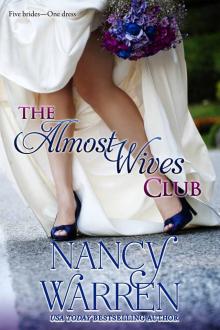 The Almost Wives Club: Kate
The Almost Wives Club: Kate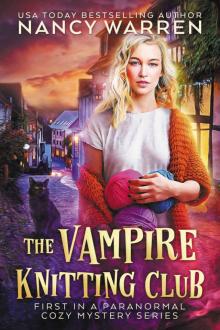 The Vampire Knitting Club: First in a Paranormal Cozy Mystery Series
The Vampire Knitting Club: First in a Paranormal Cozy Mystery Series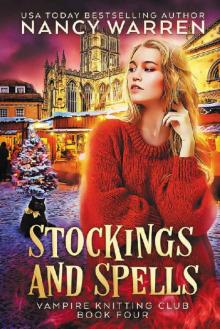 Stockings and Spells: A paranormal cozy mystery (Vampire Knitting Club Book 4)
Stockings and Spells: A paranormal cozy mystery (Vampire Knitting Club Book 4)_preview.jpg) Chance Encounter (Take a Chance: Prequel)
Chance Encounter (Take a Chance: Prequel) Let it Snow
Let it Snow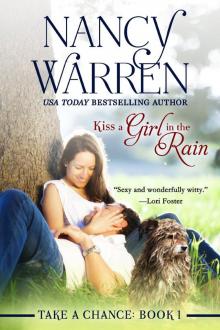 Kiss a Girl in the Rain
Kiss a Girl in the Rain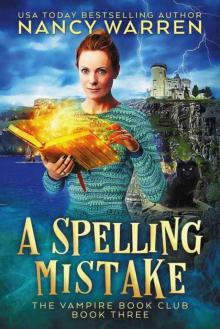 A Spelling Mistake
A Spelling Mistake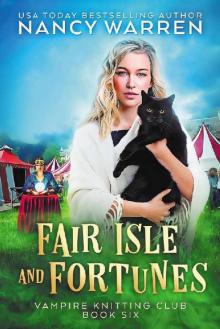 Fair Isle and Fortunes
Fair Isle and Fortunes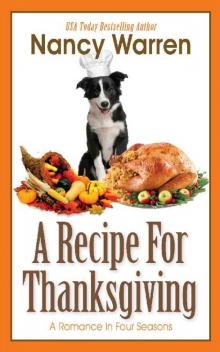 A Recipe for Thanksgiving
A Recipe for Thanksgiving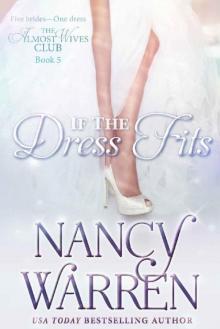 If the Dress Fits
If the Dress Fits Cat's Paws and Curses
Cat's Paws and Curses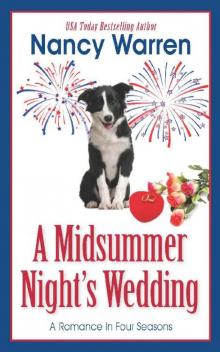 A Midsummer Night's Wedding
A Midsummer Night's Wedding Arthur
Arthur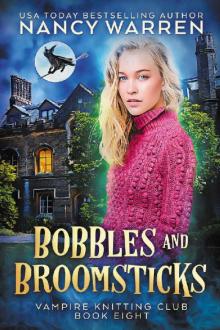 Bobbles and Broomsticks
Bobbles and Broomsticks Jack
Jack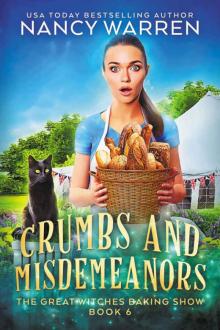 Crumbs and Misdemeanors
Crumbs and Misdemeanors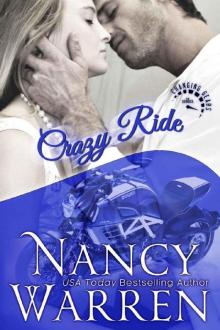 Crazy Ride
Crazy Ride George
George The Wedding Flight
The Wedding Flight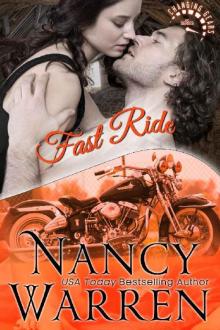 Fast Ride
Fast Ride A Diamond Choker for Christmas
A Diamond Choker for Christmas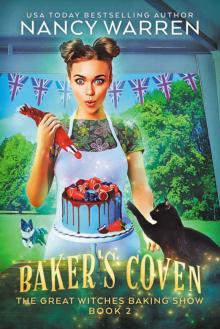 Baker's Coven
Baker's Coven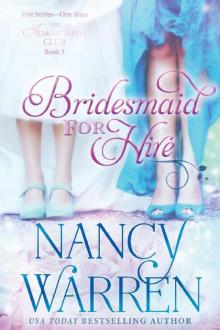 Bridesmaid for Hire
Bridesmaid for Hire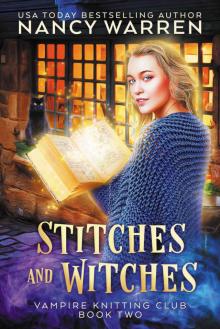 Stitches and Witches: A Paranormal Cozy Mystery (Vampire Knitting Club Book 2)
Stitches and Witches: A Paranormal Cozy Mystery (Vampire Knitting Club Book 2)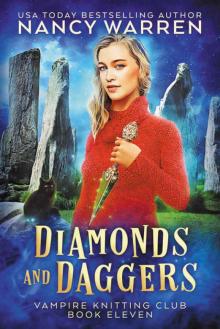 Diamonds and Daggers
Diamonds and Daggers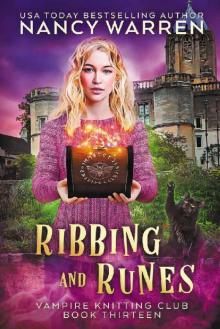 Ribbing and Runes
Ribbing and Runes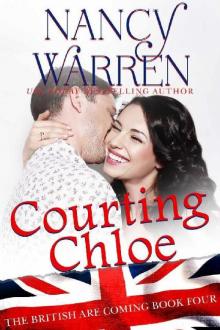 Courting Chloe
Courting Chloe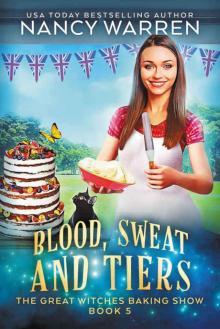 Blood, Sweat and Tiers
Blood, Sweat and Tiers By the Book
By the Book My Fake Fiancee
My Fake Fiancee A Dog Named Cupid
A Dog Named Cupid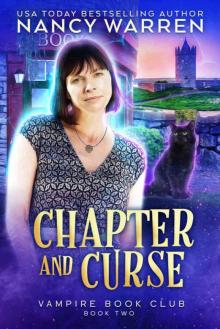 Chapter and Curse
Chapter and Curse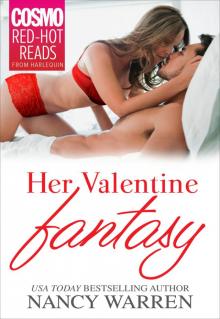 Her Valentine Fantasy
Her Valentine Fantasy The British are Coming Box Set
The British are Coming Box Set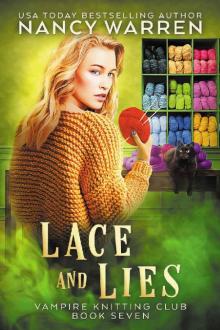 Lace and Lies
Lace and Lies Wild Ride
Wild Ride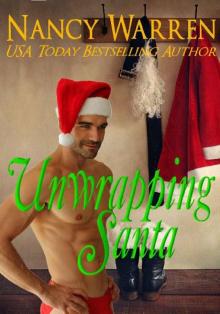 Unwrapping Santa
Unwrapping Santa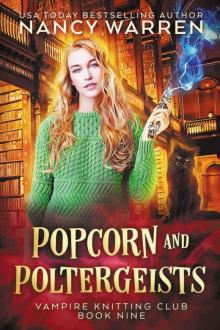 Popcorn and Poltergeists
Popcorn and Poltergeists Best Man...with Benefits
Best Man...with Benefits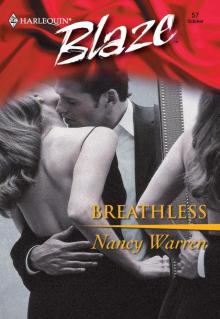 Breathless
Breathless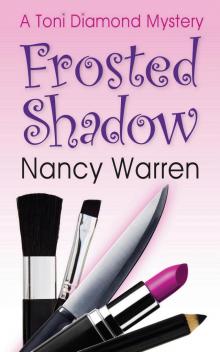 Frosted Shadow - A Toni Diamond Mystery
Frosted Shadow - A Toni Diamond Mystery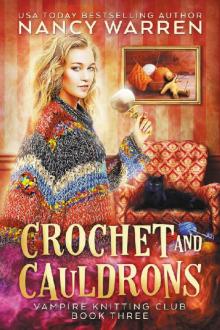 Crochet and Cauldrons: A paranormal cozy mystery (Vampire Knitting Club Book 3)
Crochet and Cauldrons: A paranormal cozy mystery (Vampire Knitting Club Book 3) Sea Kissed, A Crane Series Romance: Crane Series
Sea Kissed, A Crane Series Romance: Crane Series Bad Boys Down Under
Bad Boys Down Under Aftershocks
Aftershocks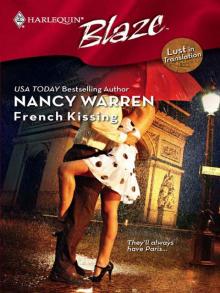 French Kissing
French Kissing Too Hot to Handle
Too Hot to Handle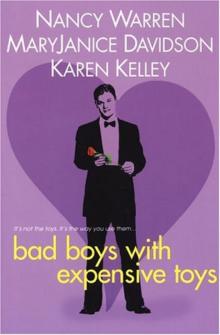 The Fourteen Million Dollar Poodle
The Fourteen Million Dollar Poodle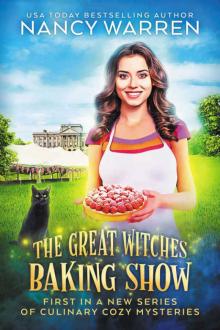 The Great Witches Baking Show
The Great Witches Baking Show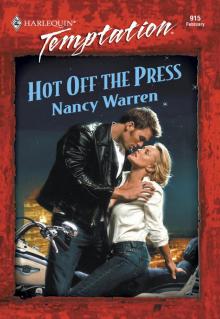 Hot Off the Press
Hot Off the Press British Bad Boys
British Bad Boys By the Book_A laugh-out-loud feel good romantic comedy
By the Book_A laugh-out-loud feel good romantic comedy Star Kissed: A Crane Series Romance
Star Kissed: A Crane Series Romance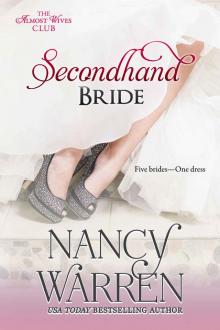 Secondhand Bride (The Almost Wives Club Book 2)
Secondhand Bride (The Almost Wives Club Book 2)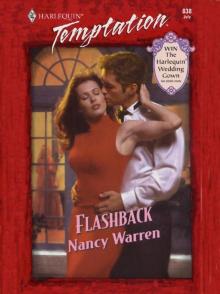 FLASHBACK
FLASHBACK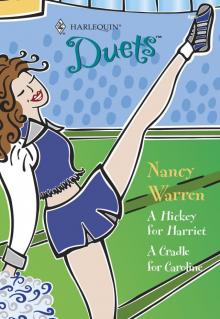 A Hickey for Harriet & a Cradle for Caroline
A Hickey for Harriet & a Cradle for Caroline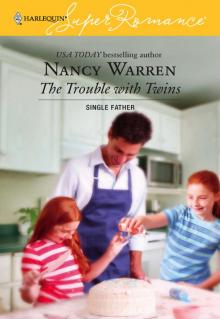 The Trouble with Twins
The Trouble with Twins Iris in Bloom: Take a Chance, Book 2
Iris in Bloom: Take a Chance, Book 2 Face-Off
Face-Off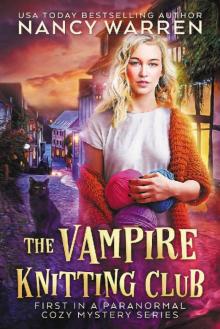 The Vampire Knitting Club: A cozy paranormal mystery series
The Vampire Knitting Club: A cozy paranormal mystery series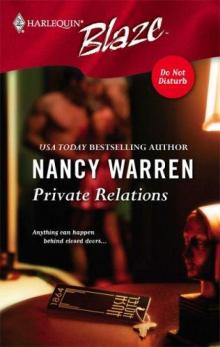 Private Relations
Private Relations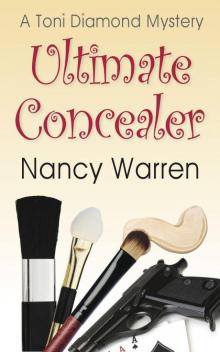 Ultimate Concealer, A Toni Diamond Mystery: A Toni Diamond Mystery (Toni Diamond Mysteries)
Ultimate Concealer, A Toni Diamond Mystery: A Toni Diamond Mystery (Toni Diamond Mysteries)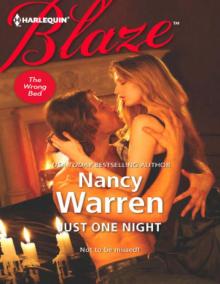 Just One Night
Just One Night Breakaway
Breakaway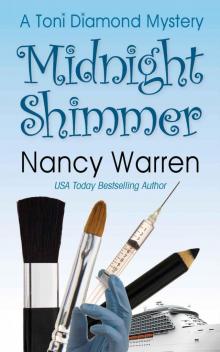 Midnight Shimmer: A Toni Diamond Mystery (Toni Diamond Mysteries Book 3)
Midnight Shimmer: A Toni Diamond Mystery (Toni Diamond Mysteries Book 3)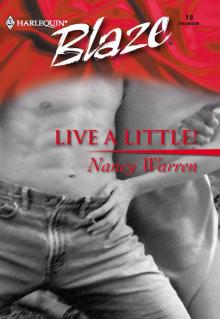 Live a Little!
Live a Little!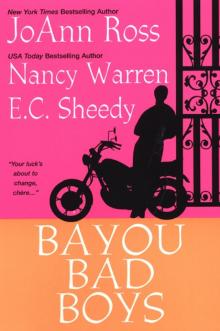 Bayou Bad Boys
Bayou Bad Boys Sun Kissed (Crane Series)
Sun Kissed (Crane Series)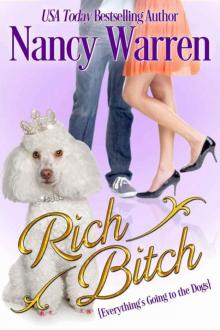 Rich Bitch: Everything's Going to the Dogs
Rich Bitch: Everything's Going to the Dogs Game On
Game On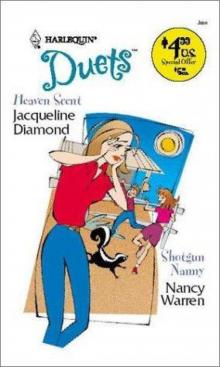 Shotgun Nanny
Shotgun Nanny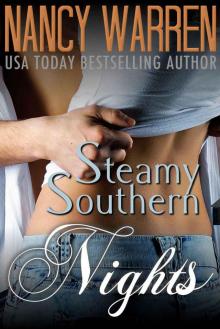 Steamy Southern Nights
Steamy Southern Nights